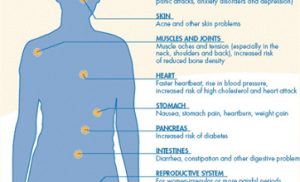What Are The Effects Of Unresolved Trauma On Stress Levels?
Imagine carrying a heavy burden on your shoulders, constantly weighing you down, affecting your thoughts, emotions, and overall well-being. This is the impact of unresolved trauma on stress levels. When traumatic events are left unaddressed and unresolved, they can have long-lasting consequences, increasing the levels of stress in your life. In this article, we will explore the effects that unresolved trauma can have on stress levels and how addressing these experiences can lead to healing and a healthier, more peaceful existence.
Effects of Unresolved Trauma on Stress Levels
The Link Between Trauma and Stress
Trauma, in any form, can have a profound impact on a person’s stress levels. When a traumatic event occurs and is left unresolved, it can create a persistent state of stress in the individual’s life. The link between trauma and stress is well-established, with traumatic experiences often leading to Chronic stress. This connection arises from the fact that trauma can trigger the body’s stress response, resulting in high levels of stress hormones coursing through the body. These elevated stress hormone levels, such as cortisol, can disrupt the body’s natural equilibrium and have detrimental effects on both physical and psychological well-being.
Physical Symptoms of Unresolved Trauma
When trauma remains unresolved, it can manifest in a variety of physical symptoms that contribute to overall stress levels. These symptoms can include headaches, muscle tension, digestive issues, and sleep disturbances. The body is constantly in a heightened state of alertness, leading to a constant sense of unease and tension. Additionally, individuals with unresolved trauma may experience a weakened immune system, making them more susceptible to illnesses and infections. The physical toll of unresolved trauma can be significant and can further exacerbate stress levels.

Psychological Effects of Unresolved Trauma
Unresolved trauma can also have profound psychological effects, which contribute to increased stress levels. Individuals may experience symptoms of post-traumatic stress disorder (PTSD), such as intrusive thoughts, flashbacks, and nightmares. They may also struggle with anxiety, depression, and hypervigilance, constantly on guard for potential threats. Unresolved trauma can affect self-esteem and confidence, leading to feelings of helplessness and hopelessness. These psychological effects not only contribute to stress levels but can also significantly impact overall mental health.
Impact of Unresolved Trauma on Relationships
Unresolved trauma can place significant strain on relationships, further contributing to stress levels. Individuals who have experienced trauma may have difficulty forming and maintaining healthy and trusting relationships. They may struggle with intimacy, communication, and emotional regulation, which can lead to conflict and emotional distance. This strain on relationships can further exacerbate the individual’s stress levels, creating a cycle of distress that is difficult to break. It is crucial to address and resolve trauma to foster healthier and more fulfilling connections with others.

Increased Risk of Mental Health Disorders
Unresolved trauma has been linked to an increased risk of developing various mental health disorders. The constant stress and emotional turmoil resulting from unresolved trauma can contribute to the development of conditions such as anxiety disorders, depression, and Substance abuse disorders. These disorders not only have a profound impact on an individual’s quality of life but also further increase stress levels. Without proper treatment and support, unresolved trauma can perpetuate a cycle of mental health challenges and heightened stress.
Chronic Stress and Unresolved Trauma
It is important to note that unresolved trauma often leads to chronic stress. Chronic stress occurs when an individual is continuously exposed to stressors without adequate time for recovery and relaxation. This prolonged activation of the body’s stress response can lead to numerous negative health effects, including cardiovascular problems, immune system dysfunction, and cognitive impairments. Chronic stress resulting from unresolved trauma can have a detrimental impact on both physical and mental well-being, underscoring the importance of addressing trauma to alleviate stress.

Effects of Unresolved Trauma on Work Performance
Unresolved trauma can significantly affect an individual’s work performance and productivity. The constant emotional distress and impaired coping mechanisms resulting from trauma can make it challenging to focus and concentrate on tasks. Additionally, the physical symptoms of trauma, such as headaches and sleep disturbances, can further hinder job performance. This can lead to difficulties meeting deadlines, increased absenteeism, and strained relationships with coworkers. The impact of unresolved trauma on work performance can contribute to an additional layer of stress for the individual.
Impaired Coping Mechanisms
Trauma often disrupts an individual’s ability to cope effectively with stress and difficult emotions. Without proper resolution and support, individuals may turn to unhealthy coping mechanisms to numb or avoid their pain. These coping mechanisms can include substance abuse, self-harm, and disordered eating. While these behaviors may provide temporary relief, they ultimately contribute to increased stress levels and can lead to further physical and psychological harm. It is crucial to learn healthy coping strategies and address unresolved trauma to establish more adaptive ways of managing stress.
Substance Abuse and Unresolved Trauma
Substance abuse and unresolved trauma often go hand in hand. Many individuals turn to drugs or alcohol as a means to escape from the distressing effects of trauma. Substance abuse, however, not only fails to address the underlying issues but further exacerbates stress levels. Substance abuse can lead to various physical and psychological health problems, strained relationships, and financial difficulties, further compounding the individual’s stress and trauma. Seeking treatment for both substance abuse and the underlying trauma is essential in breaking this destructive cycle.
The Importance of Seeking Treatment
Recognizing the effects of unresolved trauma on stress levels is the first step toward seeking the necessary help and support. If you have experienced trauma and are struggling with chronic stress, it is crucial to seek professional treatment. Therapy, such as trauma-focused therapy or cognitive-behavioral therapy, can be highly effective in addressing unresolved trauma and reducing stress levels. Additionally, support from loved ones and engaging in self-care activities can provide valuable tools for managing stress. Remember, seeking treatment is not a sign of weakness but a courageous choice towards healing and leading a healthier, more fulfilling life.

















